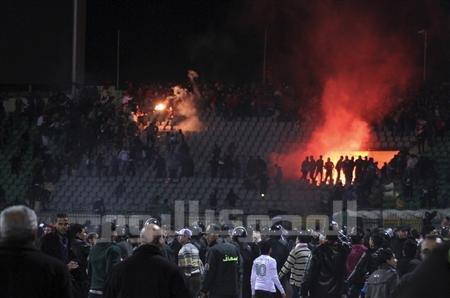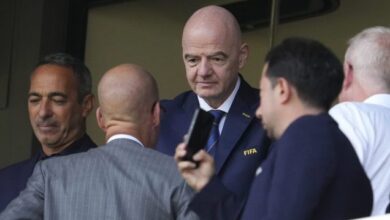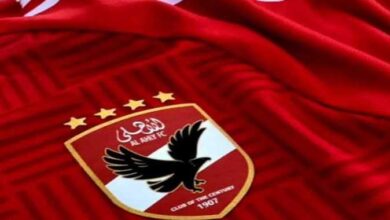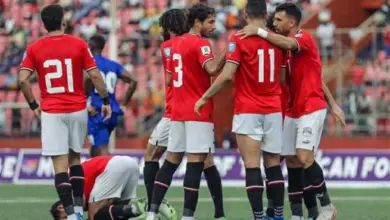
On 30 June, President Mohamed Morsy was attending a ceremony organized by the Supreme Council of the Armed Forces at the Central Military Area, also known as Hike Step, to celebrate the handover of power to Egypt’s elected leader. At roughly the same time, Egypt’s national football team was playing against the Central African Republic, in a crucial match to determine whether Egypt would qualify for the Africa Cup of Nations, to be held in South Africa in 2013.
However, Egypt’s national team, commonly dubbed the Pharaohs, was unable to qualify for the tournament after the two teams drew 1-1. In order to qualify, Egypt needed to win by two goals, after it had lost to the same team 3-2 at home in June.
The national team’s failure to qualify was rather disregarded by a media once obsessed with the most popular sport in the country. For sports media, normally accustomed to reveling in criticizing the national team and its coaches, to receive the news with such apathy was odd to many.
That attention fell to politics rather than to football stands in stark contrast with the February 2006 drowning of Al-Salam ferry in the Red Sea, which cost 1,100 passengers their lives and was associated with regime corruption. That accident also coincided with Egypt’s hosting of the Africa Cup.
“At the time of that catastrophe, state media rearranged the public’s priorities through unprecedented, extensive propaganda for the championship, urging high turnout at stadiums. So the state managed to diminish public attention to the incident,” says Emad Shahin, professor of political science at the American University in Cairo.
With today’s more dynamic political scene now taking the attention away from the game, questions are being raised about the level of distraction once engineered by the regime.
“The balance is being reset. The former regime used some sources of entertainment, such as football, to ensure people were distracted from politics and allow them to transfer their need for political affiliation, to an Islamist or leftist party for example, to certain football teams, such as Ahly and Zamalek,” Shahin says.
Ayman Abou Ayed, head of the sports department at the state-owned newspaper Al-Ahram, says Egypt’s national team played four official matches over the past few weeks that were all overshadowed by the presidential election.
The busy political landscape has also outshone the team’s declining performance. Egypt, which has won the Africa Cup of Nations seven times, has not achieved a single football success over the 18 months of the interim period following the 25 January revolution.
Egypt currently ranks 42nd in the monthly FIFA World Rankings, slipping from a respectable ninth place in July 2010.
Political interruptions
Continuous interruptions have marred both the 2010-2011 and 2011-2012 seasons. The former was put on hold for three months following the outbreak of protests in January 2011. The 2011-2012 season started six weeks behind schedule in mid-September. That season came to an abrupt end in February when a match between Ahly and Masry in Port Said left 74 people dead, after clashes between fans of the two clubs.
Prime Minister Kamal al-Ganzouri ordered the dissolution of the Egyptian Football Association (EFA) in the aftermath of the bloody match, appointed a temporary one and called off the league.
The incident turned football into a political conversation, in which the country’s military rulers and their security apparatus were charged with failing to prevent the massacre.
“This was the first time in the history of Egyptian football that victims have fallen after a football match. This match has fanned the flames of conflict between revolutionaries and the SCAF,” says Ayed.
The match sparked protests in Cairo and Port Said that were met with staunch resistance from the security apparatus. Ultras Ahlawy and Ultras White Knights, which support Ahly and Zamalek respectively, staged several marches across Egypt calling for the downfall of the SCAF and accusing it of involvement in the incident.
The protests demonstrated how hardcore football fans were becoming increasingly involved in politics, an issue that the revolution had highlighted since ultras were among the first to take to the streets in January 2011, demanding an end to the repressive practices of the police apparatus.
“The violence that erupted after the [Port Said] match is one of the most important reasons why people have lost interest in football,” Ayed says.
Meanwhile, the Interior Ministry has decided that all official matches for Egypt’s national team and other Egyptian teams be played without spectators until political conditions in the country improve.
Khaled Bayoumy, a football expert, says, “The absence of spectators is one of the reasons why people are apathetic about football. Playing regular matches at the local and African level reflects the restoration of security.”
From sports to politics: The media shifts
In the same way that political interruptions have taken the public’s attention away from football, sports media have followed suit.
After the revolution, all sports talk shows have dedicated at least a segment or more to politics. For one, former presidential candidate Ahmed Shafiq, the last premier under toppled President Hosni Mubarak, appeared on the Modern Sport channel.
Khaled al-Ghandour, a former player for Zamalek in the 1990s and a sports presenter on Dream TV, says certain issues cannot be ignored. Even a sports presenter is interested in commenting on the presidential election, he says.
“It is now necessary for me to allocate at least five minutes of the show’s one hour to politics,” he adds.
The political orientation of football icons has also become central to public opinion, rather than their usual business of sport. Ahly football star Mohamed Abu Treika was one of the first to declare support for a presidential candidate publicly. Abu Treika appeared in a YouTube clip before the first round of elections held in May and announced his support for Morsy. His decision to announce his choice for president left his club in an awkward situation, particularly since Ahly’s TV channel had been broadcasting Shafiq’s campaign commercials for free in support of his bid.
Commenting on Abu Treika’s move, Ghandour said, “Any football star has admirers who may be influenced by his choices. That is why I would have preferred that every player keeps his choice for president secret.”
Meanwhile, the support that Shafiq got from Ahmed Shoubeir, Ahly’s goalkeeper in the 1990s, and Magdy Abdel Ghany, a presenter on Modern Sport and another former Ahly player, also grabbed attention. Both Shoubeir and Abdel Ghany were entrenched in politics before the revolution, being MPs from the formerly ruling National Democratic Party, in 2005 and 2010 respectively.
“Several sports media professionals brown-nosed the former regime by giving the audience a large dose of sport to divert their attention away from politics. Today, the opposite is happening,” says Bayoumy.
Back to normal?
The Interior Ministry on Sunday announced that league matches would not resume for the 2012-2013 season, citing security concerns.
The suspension has cost the league heavily, with losses estimated at LE1.2 billion, according to a report issued by the board of directors of the EFA.
They include an average of LE570 million in annual sums payable by clubs to players, LE210 million in lost sponsorship contracts, LE200 million for TV commercials, and LE270 for contracts with satellite channels that broadcast the tournaments.
Meanwhile, the new EFA elections are due to begin at the end of August. Three electoral lists of candidates are competing for the board and its chairmanship. The first list includes members of the dissolved board, who are considered part of the former regime. The second list comprises footballers who have Islamist orientations and receive the support of the Freedom and Justice Party. The third includes reformists in the field who are associated with neither the old regime nor the increasingly powerful FJP.
This piece was originally published in Egypt Independent's weekly print edition.




